The State of Electric Cars?
This article originally appeared in the Winter 2020 Issue of Thinking Minnesota, now the second largest magazine in Minnesota. To receive a free trial issue send your name and address to [email protected].
Are Minnesotans eager to embrace a future that includes large numbers of electric vehicles, mandated by a state government rule? That is the subject of the cover story in this issue of Thinking Minnesota. When we asked Minnesota voters, we found very little support for that initiative.
The Thinking Minnesota Poll was conducted by Meeting Street Research. Interviews were completed December 12-15, 2019 among 500 registered voters with a mix of cell phone and landline interviewing. The margin of error for a sample size of N=500 is +4.38%.

The Thinking Minnesota Poll indicates that Minnesotans are not necessarily averse to the idea of driving an electric vehicle (EV). Twenty-eight percent say they are at least somewhat likely to buy such a vehicle in the future, while 71 percent say such a purchase is unlikely.
But there is little support for a rule requiring a minimum percentage of vehicles sold to be electric. Asked generally whether they would support or oppose a proposal to require a certain percentage of vehicles to be electric—if that meant the cost of gasoline-powered vehicles would increase while electric vehicles would be subsidized—only 25 percent support the proposal, while 68 percent oppose, and 48 percent strongly oppose.
If a dollar sign is attached, support for an EV mandate drops even further. Only 18 percent of Minnesotans say they would be willing to spend an additional $2,800 for a gasoline-powered car, in order to subsidize someone else’s purchase of an EV. Seventy-nine percent are unwilling to provide such a subsidy, with 62 percent “not at all willing.”
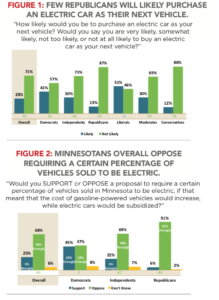
These findings suggest that imposing an electric vehicle fleet mandate on an unwilling public will be, at best, an uphill battle.
When we asked Minnesotans what should be done with the state’s projected budget surplus, 42 percent say the surplus should be given back to taxpayers, while 34 percent want to save the surplus, and only 20 percent say state government should spend it.
Asked how the surplus should be returned to taxpayers, 52 percent say the state should issue rebate checks to taxpayers, based on how much they paid in taxes. Out of those who want some of the surplus spent, the largest number, 50 percent, want it to go to infrastructure.
Minnesota is one of a handful of states that still impose an estate or inheritance tax, and its rates are among the nation’s highest. Last year, Center economist John Phelan released a study that concluded Minnesota loses money on its estate tax because it drives so many taxpayers away from the state. Earlier this year, another group of economists analyzed estate and inheritance taxes in all states where they are still collected and concluded, using a different methodology from the Center’s, that Minnesota is one of four states where the tax, on net, loses money.
The estate tax is also unpopular. This quarter’s Thinking Minnesota Poll finds that 73 percent of Minnesota voters want to repeal the estate tax, while only 22 percent want to retain it. It is interesting, too, that most voters dislike the estate tax because they see it as unfair. When asked which propositions best sum up their view of the estate tax, a remarkable 61 percent agreed with this statement: “I oppose it because it isn’t fair to pay taxes all your life, and then be taxed again when you die.”
It is noteworthy that, while support for repealing the estate tax is strongest among Republicans and Independents, Democrats also favor doing away with the tax by almost two-to-one.
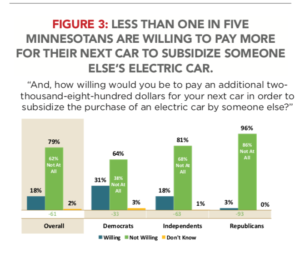
Given the absence of any positive contribution to the state’s revenues and the consensus that it is an unfair tax, repealing the estate tax should be a high priority for Minnesota’s legislature in the 2020 session. The Center will mount an intensive public campaign against the estate tax in anticipation of, and continuing throughout, the legislative session.
Everyone knows Minnesota’s personal income tax rates are high, and last year the legislature took a commendable step by cutting the second-tier tax bracket by 0.25 percent. That was a small step, obviously, but at least it was a step in the right direction. This year, the Center is recommending that the legislature cut the state’s bottom tax bracket, currently 5.35 percent, by 0.5 percent, thus giving a small tax break to all Minnesota taxpayers. This cut is particularly appropriate, since Minnesota’s lowest tax rate of 5.35 percent is higher than the highest income tax rate in 23 states.
What do Minnesotans think about this proposal? They are massively in favor of it. We asked this question:
This year, a modest reduction in taxes for the LOWEST income tax bracket has been proposed. Would you SUPPORT or OPPOSE a modest reduction in taxes for the LOWEST income tax bracket?
A remarkable 85 percent of respondents support that tax cut, with 54 percent strongly supporting it. Once again, support is bipartisan, with 93 percent of Democrats and 77 percent of Republicans in favor.
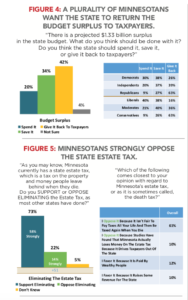
Education will be a principal focus of April’s Thinking Minnesota Poll, but we did ask a few education-related questions this month. The survey shows strong support for automatically expelling students who assault teachers in school, with 69 percent in favor (51 percent strongly in favor) and 24 percent opposed. The fact that it is even necessary to ask such a question is, unfortunately, a sign of the times.
We also polled a proposal that was introduced in 2018 and likely will be introduced again in 2020: “Regarding political bias in the classroom, do you SUPPORT or OPPOSE a state law to require public and charter schools here in Minnesota to adopt academic balance policies to prevent one-sided political expression in the classroom?” The Thinking Minnesota Poll finds that 63 percent support that anti-political bias measure, with only 26 percent opposed.
Support for school choice also remains strong among Minnesotans. Asked whether, regardless of their views on school choice generally, they would support or oppose “an exploratory small-scale experimental pilot program allowing students in one or two failing school districts to attend a public or private school of their choice, and after two years, compare test results with their peers at the original school,” a resounding 71 percent support such a pilot program, with only 18 percent opposed.
Minnesota has, of course, a reputation as a blue state—a reputation that, when it comes to specific policy issues, is usually not borne out by poll data. This month, we asked Minnesota voters whether they think that in general, social welfare benefits in Minnesota are too generous, not generous enough, or about right. The results are mixed. While 34 percent of Minnesotans say they are too generous, 14 percent think they are not generous enough, and a plurality of 39 percent say they are about right. So, despite currently high levels of welfare benefits in the state, 53 percent of Minnesotans think they are about right, or should be even higher.
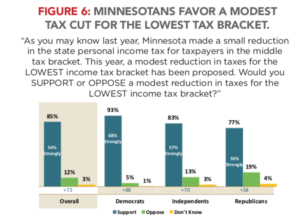
Twin Cities crime has been in the news lately. Minnesotans believe that Twin Cities crime is increasing—57 percent say it is rising, compared with only 4 percent who think it is declining. Whether this perception is due to experience or newspaper headlines is unclear. In any event, Minnesotans are definitely worried about violent crime. Seventy-six percent say they are concerned about violent crime, while only 23 percent say they are not. Twin Cities women (84 percent) and Twin Cities residents aged 55 and up (86 percent) express the highest levels of concern.
One of the stranger stories in the news recently was a decision from the Minnesota Court of Appeals that reversed the grant of a permit by the Minnesota Pollution Control Agency to a dairy farmer to expand the size of his herd. The court held that the MPCA had not adequately taken into effect the impact of the larger dairy herd on the Earth’s climate. Most Minnesotans don’t think this logic makes sense; 63 percent oppose “the use of carbon dioxide emissions as a reason to block agricultural development.” Perhaps the more surprising finding is that 27 percent say they do support blocking ag development on account of climate concerns.
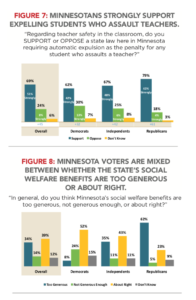
In the upcoming session, legislation will be introduced to allow grocery and convenience stores to sell wine and beer. The Thinking Minnesota Poll finds that this proposal is popular, with 58 percent in favor, and 33 percent opposed.
And, finally, the most one-sided finding in this month’s survey. We asked:
As you may have heard, Minnesota’s Department of Human Services has had a series of scandals involving multiple instances of fraud, waste, and mismanagement in the Department. Based on what you know, do you SUPPORT or OPPOSE legislation requiring an audit of the Department of Human Services’ spending?
An overwhelming 90 percent support legislation requiring an audit of DHS, 71 percent strongly, with only 8 percent opposed.
John Hinderaker is President of Center of the American Experiment.